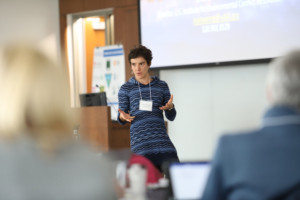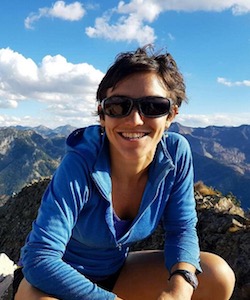By Danya Rumore

Unhealthy air quality. Growing demands for water in an arid state. Conflicts over public lands and how those lands should be managed. These are just a few environmental and natural resources challenges here in Utah that we hear “keep people up at night.” Such challenges are indeed daunting, and they will not be easily solved. However, in every challenge there is an opportunity. And when it comes to environmental and natural resources challenges, there is a powerful opportunity for people to work together to find mutually beneficial solutions that are, as consensus building guru Larry Susskind puts it, “fair, efficient, stable, and wise.”
Recognizing this opportunity, the Environmental Dispute Resolution (EDR) Program partnered with The Langdon Group to launch our Utah Program on Collaboration in fall 2015. In the two years since, the Program on Collaboration has grown to include the Forum on Collaboration, which is held every other year for high-level state and federal agency leaders; Dialogues on Collaboration, which are half-day events focusing on specific collaboration-related topics that are held twice a year and are free and open to the public; and the annual Short Course on Effective Natural Resources Collaboration, a professional training teaching the art and science of collaborative problem solving. The overall aim of the Program on Collaboration is to foster a culture of collaboration here in Utah, and to position us, as a state, in leading the way in working together to address environmental and natural resource concerns.
Get notified when new articles are posted to the EDR blog – sign up for our email list »
On December 13, 2017, we had the pleasure of bringing together more than 30 state and federal agency leaders from around Utah for our second Forum on Collaboration. During the half-day event, the group discussed what collaboration is and is not, examples of environmental and natural resources collaboration here in Utah, lessons learned from collaborative efforts, and opportunities and challenges for collaboration. As with our inaugural Forum on Collaboration held on November 19, 2015, we were amazed and inspired by agencies’ resounding commitment to work together and with other stakeholders to address Utah’s environmental and natural resources challenges. As Utah State Governor Gary Herbert said in his welcome for the event, “Effective collaboration is a wonderful tool for bettering government and improving the life of Utahns. That is why the State of Utah is committed to supporting collaborative approaches to addressing difficult issues.” There is still much work to be done to translate this high-level agency support for collaboration into on-the-ground problem solving. However, based on the two Forums we’ve held, we believe state and federal agencies in Utah are well poised to lead the way in addressing our key environmental and natural resource concerns. For more information about the 2017 Forum on Collaboration, see the Forum guidebook, discussion summary, presentation slides, and Governor’s welcome video.
On the afternoon of December 13, 2017, we hosted our fourth Dialogue on Collaboration, which focused on “Funding for Collaboration: Resources and Challenges.” Our Dialogues bring together panelists from around the region and the nation to share their wisdom with participants. They also create a space for attendees to engage in peer-to-peer learning. This past Dialogue featured panelists from two state entities—the Utah Department of Transportation and the Watershed Restoration Initiative—along with Brian Manwaring, the Director of the US Institute for Environmental Conflict Resolution and Laurel Singer, the Director of the National Policy Consensus Center. Some insights and nuggets of wisdom that emerged included: Oregon’s system for providing legislative funding for statewide conflict resolution programs could be a relevant model for Utah; public-private partnerships are a powerful way to support collaborative projects; seed funding that gets a collaborative effort going often attracts more funding; and it is helpful to stage the collaborative work to build buy-in, which often results in additional resources to support the effort. We will be posting a handout sharing additional ideas and insights related to funding for collaboration on our Utah Program on Collaboration webpage in the next few weeks. For more information, see the video of the panel presentation and event agenda.
This coming April, we will graduate the second cohort of Short Course on Effective Natural Resources Collaboration students. The course teaches mid- and upper-level professionals and other individuals working on environmental and natural resources issues in Utah the “art and science” of collaborative problem-solving over six two-day sessions. It does so through lectures, case studies, peer-to-peer sharing, discussion, and simulation exercises. Students put the concepts and skills learned through the course into action in a real-life setting by designing and implementing an applied collaboration Capstone Project. The inaugural 2016 Short Course graduated 23 high-level professionals representing state and federal agencies, local government, NGOs, industry, resource user groups, and tribal organizations from around the State of Utah. The 2017 Short Course includes 19 participants representing an equally diverse range of stakeholder interests from across the state. The Wagner Charitable Foundation and Huntsman Corporation have provided generous funding for scholarships to help ensure each Short Course cohort includes a diverse range of stakeholder participants. Short Course graduates become part of an EDR Fellows Network, which supports ongoing peer-to-peer learning, information sharing, and collaborative capacity building opportunities. We are accepting applications for the 2018 Short Course now through March 26, 2018. See our 2018 Short Course handout for more information. To apply for the course, use the online Short Course application form.
As we move forward in our endeavor to create a culture of environmental and natural resources collaboration here in Utah, we anticipate continuing to offer our Forum, Dialogues, and Short Course as long as there is an interest and demand. We also welcome ideas about how the EDR Program and our partners can expand our efforts to foster collaborative problem solving around Utah’s current and emerging challenges.
To collect thoughts and ideas about how we can improve and potentially grow our Utah Program on Collaboration, we have created a brief online feedback form. If you have any feedback on the Program on Collaboration, ideas for how we can continue to improve and expand it, or suggestions for potential sponsors, please share your thoughts via the online form before end of day on February 28, 2018.
We hope to see many of you at our future Utah Program on Collaboration events. In the meantime, please spread the word that we are now accepting applications for the 2018 Short Course on Effective Natural Resources Collaboration, and watch for more information about our next Dialogue on Collaboration, which will be held this summer.
Finally, thank you to the many Utah Program on Collaboration sponsors, who are helping us cultivate a culture of collaboration throughout Utah.
 Danya Rumore, Ph.D., is the Director of the Environmental Dispute Resolution Program in the Wallace Stegner Center at the University of Utah. She is a Research Assistant Professor in the University of Utah’s S.J. Quinney College of Law and City and Metropolitan Planning Department. She teaches about, practices, and conducts research on negotiation, dispute resolution, leadership, and collaborative problem solving.
Danya Rumore, Ph.D., is the Director of the Environmental Dispute Resolution Program in the Wallace Stegner Center at the University of Utah. She is a Research Assistant Professor in the University of Utah’s S.J. Quinney College of Law and City and Metropolitan Planning Department. She teaches about, practices, and conducts research on negotiation, dispute resolution, leadership, and collaborative problem solving.
